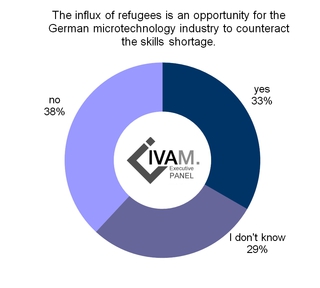Refugees who come to Germany should be able to take up employment faster, say representatives of the microtechnology industry according to a brief survey of the IVAM Microtechnology Network. However, only one-third of the surveyed industry experts see heightened chances of winning professionals for their own industry through the strong current refugee influx. A factor of uncertainty is the initially unclear residence status of refugees. This stands in contrast to the high specialization of microtechnology companies, which usually requires long and expensive training.

The strong influx of refugees, some of whom are trained specialists, has triggered a debate about the integration of asylum seekers into the labor market. Representatives of the government and industry associations are regarding the immigration as an opportunity for the economy and a chance to overcome skilled labor shortages that are expected as a result of the progressing demographic change. For the same reason, the EU and the German federal government have been trying for some time to bring qualified immigrants to Europe and Germany with the Blue Card and simplified regulations.
Whether the current influx of refugees carries future professionals for the microtechnology industry into Germany, seems rather unclear at the moment. A third of the interviewed experts say that the influx of immigrants is an opportunity to win professionals for the industry. But prerequisite for their employment is that an effective integration policy will be established.
A barrier to the employment of refugees in specialist positions, according to the industry experts, is the high specialization of microtechnology companies. Working in high-tech enterprises often requires a very specific knowledge and long and expensive training, which is only practical if the trained person has a long-term residence perspective. According to media reports, many refugees intend to return to their home country in the medium term even if they have prospects of obtaining a permanent residence permit. This is a hurdle for employment on both sides, employers and candidates.
Although German microtechnology companies often operate internationally or employ graduates from abroad, immigrants are expected to speak or learn German, if they want to work in specialist positions. English language skills may be sufficient at first for recurring workflows in the high-tech industry, the microtechnology experts say. In the long term, however, German language skills are considered essential to integrating immigrants into the companies and into society.
The industry representatives almost agree that refugees who come to Germany should get a work permit more quickly – also in order to facilitate their integration and to relieve the social system. Preferably, the status and prospects of a long-term stay in Germany should be clarified before a work permit is issued. If the authorities should fail to speed up asylum procedures, temporary asylum confirmations and temporary work permits may be advisable.
The authorities are not only advised to establish an effective integration policy in Europe. Politicians should put more effort into addressing the causes for flight in the countries of origin. The aim of European policy should not only be to defuse the crises in war zones, but also to support the economy in safe countries of origin.

